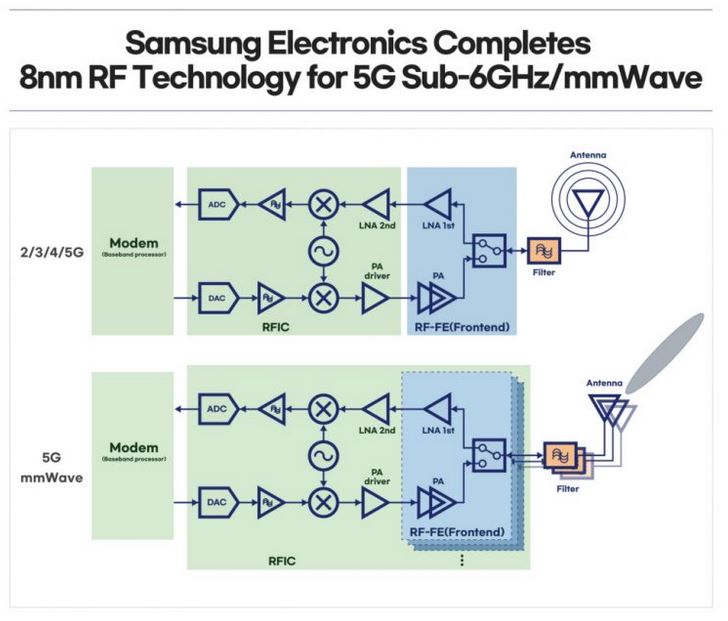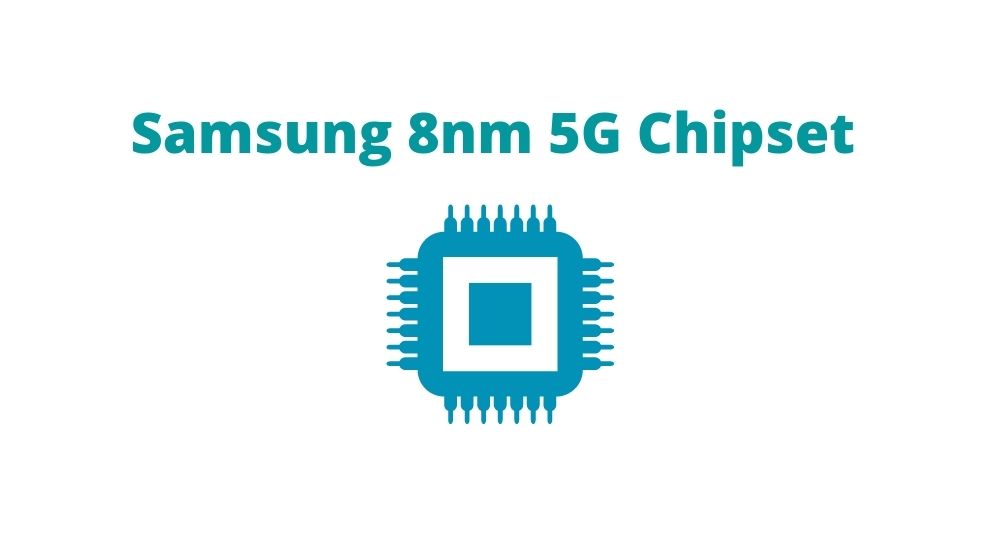Samsung has successfully developed an 8nm RF solution for 5G. It claims the 8nm net-gen RF solution will improve both the performance and power efficiency of smartphones by 35%. Samsung expects the chipset to enable their leadership in the 5G semiconductor business for spectrum ranging from Sub 6GHz to mmWave.
South Korean tech firm Samsung is one of the leading semiconductor manufacturers in the world. It is the number one memory chip maker and the second-biggest chipmaker only trailing TSMC, a Taiwanese firm. Samsung makes its Exynos chip for smartphones while it also cooperates with other semiconductor firms to manufacture chips for them.
The company has announced that they have self-developed an 8nm Radio Frequency solution that could significantly improve both the performance and power efficiency of 5G chips.
Samsung says the 8nm silicon can help create a ‘one-chip solution’ for the fifth-generation communications incorporating both multi-channel and multi-antenna design.
Hyung Jin Lee, Master of Foundry Technology Development Team at Samsung, said, “Through excellence in innovation and process manufacturing, we’ve reinforced our next-generation wireless communication offerings. As 5G mmWave expands, Samsung’s 8nm RF will be a great solution for customers looking for long battery life and excellent signal quality on compact mobile devices.”
Samsung’s home-brewed 8nm solution succeeds its previous 28nm and 14nm RF chips by a huge gulf in its capacities. Due to its high-efficiency potentials, Samsung will commercialize its deployment on smartphones, and other 5G enabled devices soon.
Read: IBM Claims 2nm Chip Breakthrough: Increases Performance by 45%
Digital vs Analogue Circuits
Traditionally digital circuits have evolved with performance. With each new innovation, it has seen improved power performance, improved power efficiency, and area coverage. On the other hand, RF solutions, the analog equivalents have lagged behind due to their narrow line width. This has resulted in the reduced performance of RF-based chips.

Now, Samsung claims to have found a solution to this drawback. It says the company has developed “a unique architecture using its 8nm process node called RFextremeFET (RFeFET)”.
Also read: Global Chip Shortage and Its Impact on Industries
Performance To Improve
The advanced RFextremeFET architecture servers for an improved performance and power delivery. By supplementing digital PPA scaling and analog/RF scaling simultaneously, it achieves a next-gen performance on 5G platforms.
Samsung has claimed its RFeFET architecture will lower down the number of transistors and power consumption, also reducing the area of an analog circuit. This means that the 8nm RF solutions will render a 35% bump in power efficiency and another 35% smaller die area.
Samsung is only behind TSMC, a Taiwanese firm, in the semiconductor business with a value worth $261.9 billion. Nvidia, which manufactures GPUs, trails Samsung at third. With its net-gen 8nm chips, Samsung seeks a prospect of bolstering its lead in the contract chipmaking business.
Samsung is a leading smartphone manufacturer and the global leader in memory chip makers. With its 8nm RF solutions, it could beef up its market presence further in 5G’s eco-system.
Check out: Top Smartphone manufacturers in Nepal
Apart from being a premium smartphone maker, it is also laying hands in 5G’s chip-making business. Do you see Samsung challenging the likes of Huawei and US firms in the 5G race? Let us know how you feel about Samsung’s credentials in the comments below.













